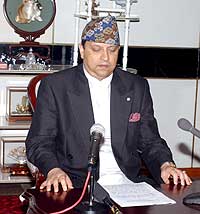 We wouldn't exactly say that the Nepali people were euphoric about King Gyanendra's move to sack the prime minister and form a new government. But they were beginning to hold politicians in such low esteem, and had watched the country suffer chronic abuse from greedy and selfish politicians for so long, that they did not complain when the king took over executive powers last Friday.
We wouldn't exactly say that the Nepali people were euphoric about King Gyanendra's move to sack the prime minister and form a new government. But they were beginning to hold politicians in such low esteem, and had watched the country suffer chronic abuse from greedy and selfish politicians for so long, that they did not complain when the king took over executive powers last Friday. In fact, they welcomed the fact that here at last was someone who could take a decisive step, assume responsibility, and try to take the country out of the rut it is in. For a lot of Nepalis it has stopped mattering who rules over us, as long as peace is restored. Trapped between the far right and the far left, abused by both the security forces and the Maoist militia, the Nepali people were desperate enough to cling to this straw.

But the king's move is fraught with dangers: for himself, for the constitutional monarchy and for this country's future. The king seems to have reasoned that if he waited any longer, the politicians would have made such a mess that the Maoists could just walk into Kathmandu. But therein lies the biggest paradox in all this: the king has sidelined the very political parties that he will need in the long term to build public support against the Maoists and restore peace.
The king has gambled his throne on this one. And that act, by its very nature, has dragged the monarchy into the political muck. A constitutional monarchy needs to be above it all, untainted by partisanship and upheld as a symbol of national unity. It is now in danger of being just another political force jostling for power.
Having pushed the envelope on the constitution by assuming executive authority, the king has removed the parliamentary buffer, bringing him face-to-face with revolutionary republicans. The country is therefore effectively polarised between the monarchy and the Maoists, between the ultra-left and the right. The centre has been pulled away from us, and this is precisely what the Maoists wanted all along.
The king is also finding it more difficult than he had imagined to cobble together a council of ministers made up of nominees from the political parties. Stung by the royal move, some parties have tried to remain united and resist royal pressure to give in. At a time when the palace and the parties should have remained united to counter extremists, there is now a deep fissure of mistrust between them.
The composition of the council of ministers and the appointment of the new prime minister is a critical factor. The biggest danger now is that the palace and the new government will be dragged to the right by reactionary forces. Born-again Panchayat throwbacks will be doing the monarchy a great disservice if they see this as a chance to turn the clock back. Time has moved on.
And that is our advice to the Maoists as well: study your history, comrades. Remember how countries pushed to the brink by domestic rebellion are ripe for the picking by outsiders. You have gone as far as you can with the gun. This is your opportunity to join up with the mainstream, otherwise total ruin lies ahead.


